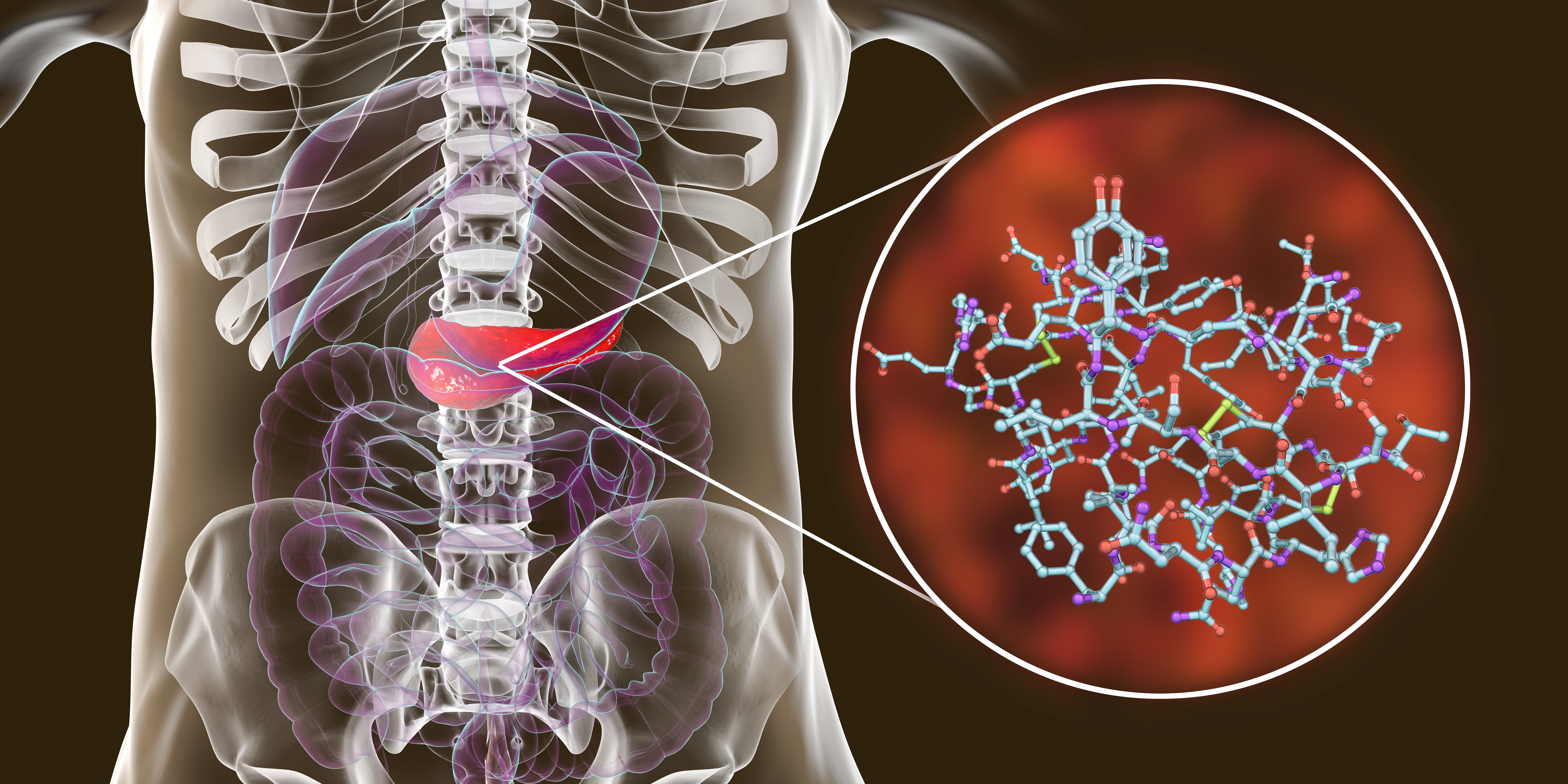|
|
| The Key to Kicking Your Sugar Habit Is in Your Brain- Not Your Tastebuds |
|
Sugar substitutes sure taste sweet, but let’s be honest, they’re never quite as satisfying as the real thing. And until now, science has never been able to explain why. But recently, researchers at Columbia University’s Zuckerman Institute have discovered neurons in the brains of mice that respond to sugar – not only on the tongue, but also in the gut.
|
| |
|
ADVERTISEMENT
|

|
|
| Small Rises in Blood Sugar Cause Major Changes in Gene Expression In Pancreatic Beta Cells |
 New research from the Joslin Diabetes Center helps illuminate the process of glucose toxicity in pancreatic beta cells. Observing the behavior of these cells in lab rats following parial pancreatectomy, researchers were able to observe how small consistent rises in blood sugar levels typical of pre-diabetes caused changes in gene expression that impeded the ability of beta cells to produce insulin.
New research from the Joslin Diabetes Center helps illuminate the process of glucose toxicity in pancreatic beta cells. Observing the behavior of these cells in lab rats following parial pancreatectomy, researchers were able to observe how small consistent rises in blood sugar levels typical of pre-diabetes caused changes in gene expression that impeded the ability of beta cells to produce insulin.
|
| |
|
| Does Fertility Affect the Risk For Obesity and Diabetes? |
 For years the controversy regarding the connection between reproductive health and body mass index has raged on, leaving women and their doctors with more questions than answers. Are overweight women less fertile? Does primary ovarian insufficiency increase risks for obesity and diabetes?
For years the controversy regarding the connection between reproductive health and body mass index has raged on, leaving women and their doctors with more questions than answers. Are overweight women less fertile? Does primary ovarian insufficiency increase risks for obesity and diabetes?
|
| |
|
| Improving Diabetes Care In the Midst of a Global Pandemic |
 In the midst of the coronovirus epidemic, managing diabetes is now more important - and perhaps more challenging -than ever. Even in the best of times, primary care physicians sometimes struggle to effectively treat patients with diabetes. However, patient fears, and restrictions in day-to-day life due to social distancing may make it more difficult for patients to get medications, arrive at appointments, or stay on track with physical activity and healthy eating.
In the midst of the coronovirus epidemic, managing diabetes is now more important - and perhaps more challenging -than ever. Even in the best of times, primary care physicians sometimes struggle to effectively treat patients with diabetes. However, patient fears, and restrictions in day-to-day life due to social distancing may make it more difficult for patients to get medications, arrive at appointments, or stay on track with physical activity and healthy eating.
|
| |
|
| The Obesity Algorithm: Why Weight Management May Be More Important Now Than Ever |
 Obesity-related conditions seem to worsen the effect of COVID-19. The Centers for Disease Control and Prevention (CDC) reported that people with heart disease and diabetes are at higher risk of COVID-19 complications, and the World Obesity Organization predicts that a large percentage of patiients with the coronavirus will have a BMI over 25. Many aspects of patient management can be more difficult in the obese patient, including diagnostic imaging, intubation, positioning, and transport, making it more important than ever for patients and their physicians to prioritize weight management strategies.
Obesity-related conditions seem to worsen the effect of COVID-19. The Centers for Disease Control and Prevention (CDC) reported that people with heart disease and diabetes are at higher risk of COVID-19 complications, and the World Obesity Organization predicts that a large percentage of patiients with the coronavirus will have a BMI over 25. Many aspects of patient management can be more difficult in the obese patient, including diagnostic imaging, intubation, positioning, and transport, making it more important than ever for patients and their physicians to prioritize weight management strategies.
|
| |
|
| Study Finds Internet Based Health Management Has Benefits |
 Overweight, hypertensive patients who enrolled in a self-administered, internet-based health management program had better outcomes than patients who did not join the program, according to recent study findings.
Overweight, hypertensive patients who enrolled in a self-administered, internet-based health management program had better outcomes than patients who did not join the program, according to recent study findings.
|
| |
|
| A New Role for Aspirin Therapy: GI Cancer |
 Aspirin, the popular and well-established therapy for cardiovascular disease may have a new role in treating cancers of the digestive tract.
Aspirin, the popular and well-established therapy for cardiovascular disease may have a new role in treating cancers of the digestive tract.
|
| |
|
| Impact of ACEi/ARBs in COVID-19 Patients Focus of New Clinical Trial |
 In an effort to settle the debate surrounding the use of ACE inhibitors (ACEI) and ARBs during the ongoing coronavirus disease 2019 (COVID-19) outbreak, investigators from Perelman School of Medicine at the University of Pennsylvania, recently launched a new clinical trial. The REPLACE COVID trial plans to recruit 152 hospitalized patients already taking medications from the classes, with the goal of determining whether discontinuing use affects the severity of disease symptoms.
In an effort to settle the debate surrounding the use of ACE inhibitors (ACEI) and ARBs during the ongoing coronavirus disease 2019 (COVID-19) outbreak, investigators from Perelman School of Medicine at the University of Pennsylvania, recently launched a new clinical trial. The REPLACE COVID trial plans to recruit 152 hospitalized patients already taking medications from the classes, with the goal of determining whether discontinuing use affects the severity of disease symptoms.
|
| |
|
|
|
| |
|
VIDEO: Teprotumumab Offers Hope for Thyroid Eye Disease Patients
|
 New research shows teprotumumab can be a beneficial treatment for patients suffering from thyroid eye disease. In an interview with HCPLive®, Raymond Douglas, MD, PhD, director of the Orbital and Thyroid Eye Disease Center at the Cedars-Sinai Medical Center, explained the importance of the teprotumumab in treating this patient group and how the coronavirus disease 2019 (COVID-19) might impact thyroid eye disease patients.
New research shows teprotumumab can be a beneficial treatment for patients suffering from thyroid eye disease. In an interview with HCPLive®, Raymond Douglas, MD, PhD, director of the Orbital and Thyroid Eye Disease Center at the Cedars-Sinai Medical Center, explained the importance of the teprotumumab in treating this patient group and how the coronavirus disease 2019 (COVID-19) might impact thyroid eye disease patients.
|
| |
|
| VIDEO: Lipid Management in Diabetic Patients with Cardiovascular Disease |
 Deepak Bhatt, MD, MPH, executive director of Interventional Cardiovascular Programs at Brigham and Women’s Hospital talks with HCPLive's Patrick Campbell about the American Heart Association's recommendations from the lipid management portion of their scientific statement discussing both coronary artery disease (CAD) and type 2 diabetes (T2D).
Deepak Bhatt, MD, MPH, executive director of Interventional Cardiovascular Programs at Brigham and Women’s Hospital talks with HCPLive's Patrick Campbell about the American Heart Association's recommendations from the lipid management portion of their scientific statement discussing both coronary artery disease (CAD) and type 2 diabetes (T2D).
|
| |
|
|
Being Born by Cesarean Increases Odds of Obesity and Diabetes
|
 A new study has identified a significant association between being born via cesarean delivery and increased risks of obesity and type 2 diabetes in adulthood.
A new study has identified a significant association between being born via cesarean delivery and increased risks of obesity and type 2 diabetes in adulthood.
|
| |
|
| We want to hear from you! |
|
Did you love an article you read in Endocrinology Network? Disagree with an author’s conclusions? Want to share how you solved an issue in your practice? Then Endocrinology Network editors want to hear from you! Please send your comments to GCudaKroen@mjhlifesciences.com.
|
| |
|